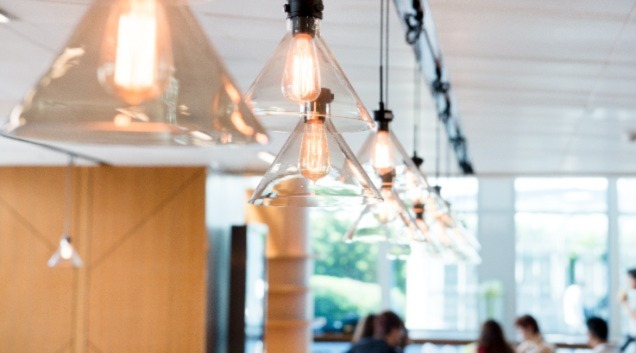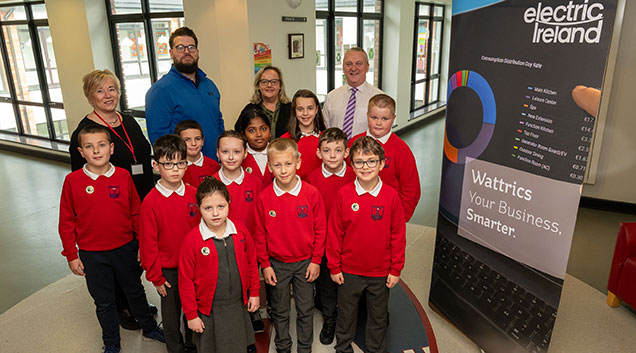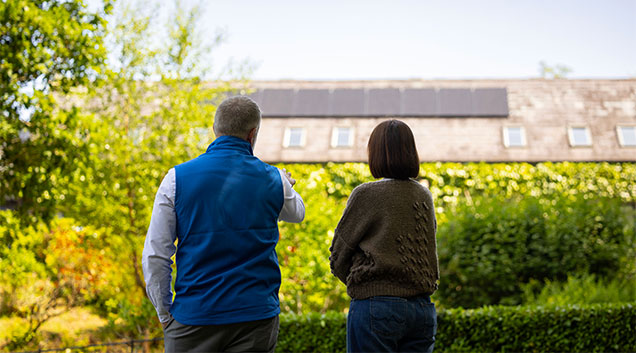
Electric Ireland has compiled a list of useful tips to help your business reduce its use and maximise your energy efficiency for the Winter months ahead:
Conduct an energy audit
An energy audit is a review of your company’s energy use and involves a full inspection of your facility and all your equipment that consumes electricity. Once your business has been inspected, the auditor will make a series of energy-saving recommendations.
To find a registered, independent energy auditor in your area, click here to see the full list on the SEAI website. Many grants are available depending on business size and sector – see more here.
Understanding your usage
Understanding your energy use is key to managing your consumption.
Our SME Premium Insights tool, accessible through your Business Online portal, includes many great features, like:
- End of Use breakdowns, that shows customers which appliances are using the most electricity and costing them the most.
- Our Peer-to-Peer comparison feature offered by Premium Insights also gives you an overview of your energy usage and costs compared to others in your business sector.
- Personalised electricity saving tips, that are tailored to your business’ requirements.To ensure the most accurate energy and cost saving calculations, update your Business Online and SME Premium Insights profile to give as much company detail as possible – this will ensure that your energy saving tips are most accurately tailored to your needs.
To ensure the most accurate energy and cost saving calculations, update your Business Online and SME Premium Insights profile to give as much company detail as possible – this will ensure that your energy saving tips are most accurately tailored to your needs.
Learn more about our SME Premium Insights tool here.
Get your lighting right:
It may sound obvious, but significant savings can come from ensuring that lights are only used when needed, and that you’re using the most efficient type of bulb - Lighting accounts for up to 40% of the average electricity bill.Turn off lights in rooms that aren’t in use. Sensors can be particularly useful for this, particularly in communal areas such as toilet facilities and break-out areas, where people may be unsure of whether or not to leave lighting on; occupancy sensors alone can cut energy use from lighting by 30%.
Another key energy saving tip is making the switch to LED lights or high frequency T5 fluorescent lights. These can save 45% in energy costs compared to T8 and T12 tubes. And switching your halogen light bulbs to LEDs can cut your lighting costs by up to 80%.
As well as being cheaper to use, these bulbs can last up to twice as long and provide the same light output, so it’s worth investing the upfront cost to upgrade all of your lights.
Given the high volume of light fittings in many businesses, these changes will have an immediate impact on your usage.
Ownership and buy-in – get your employees involved:
In order to be energy efficient across all areas of your business, energy saving initiatives need to be implemented as a company-wide effort, ensuring that everyone feels they are playing their part; make sustainability a company-wide mission.The greater the buy-in from staff in every level and area of the building, the greater your cost savings can be. Create ownership within each team and grant each team leader the authority to make decisions for their sector. Involve and engage everyone in the business – the more integrated sustainability is into your company culture, the more energy efficient you will be.
Look after your heating, ventilation and air-conditioning (HVAC)
Regular maintenance of your HVAC system will lead to cost savings in the long run as units will last longer and require few repair costs.In addition, programme your thermostats – making small adjustments to how long your heat is on, and to the thermostat settings, can have a sizeable impact on your bill. Set your heating at 19°C (18°C is fine for corridors and storerooms) and cooling set at 24°C or higher. Be mindful of your thermostats if you have different working hours at the weekend.
Invest in smart thermostats which can be controlled remotely giving you access to your HVAC settings 24/7 – savings at your fingertips.Operational Changes:
Assess electrical equipment usage patterns in the premises. Review all activities that use electricity and consider how you can reduce your use during peak demand. Can any electrical equipment be reduced or changed to night-time usage?Ensure that your equipment is regularly serviced, and upgrade older models – for example, older boilers can be replaced with far most energy and cost-efficient condensing boilers. Optimise your use by linking heating controls to your booking system. Decouple fresh air requirement from heating requirement – smart appliances can make a big difference!
By keeping regular track of your usage reports and bills, you’ll be able to identify what changes in behaviour are the most effective at minimising usage and costs – monitoring and reviewing your bills are key to future.
There’s no single solution to cutting energy costs for your business. However, understanding your usage sets you up for a good start. By signing up to our Business Online portal, you’ll have access to a record and breakdown of previous months’ bills, and the ability to submit meter readings to ensure more accurate billing. In addition, you’ll have access to our Premium Insights tool, which includes features like End of Use breakdowns, the Peer-to-Peer comparison feature, and personalised electricity saving tips, tailored to your business’ requirements.
Understanding your usage is key to making savings, that’s what these tools empower you to do. Sign up for Business Online today.
Follow Electric Ireland on social media: Twitter: @electricireland LinkedIn: @ElectricIreland



